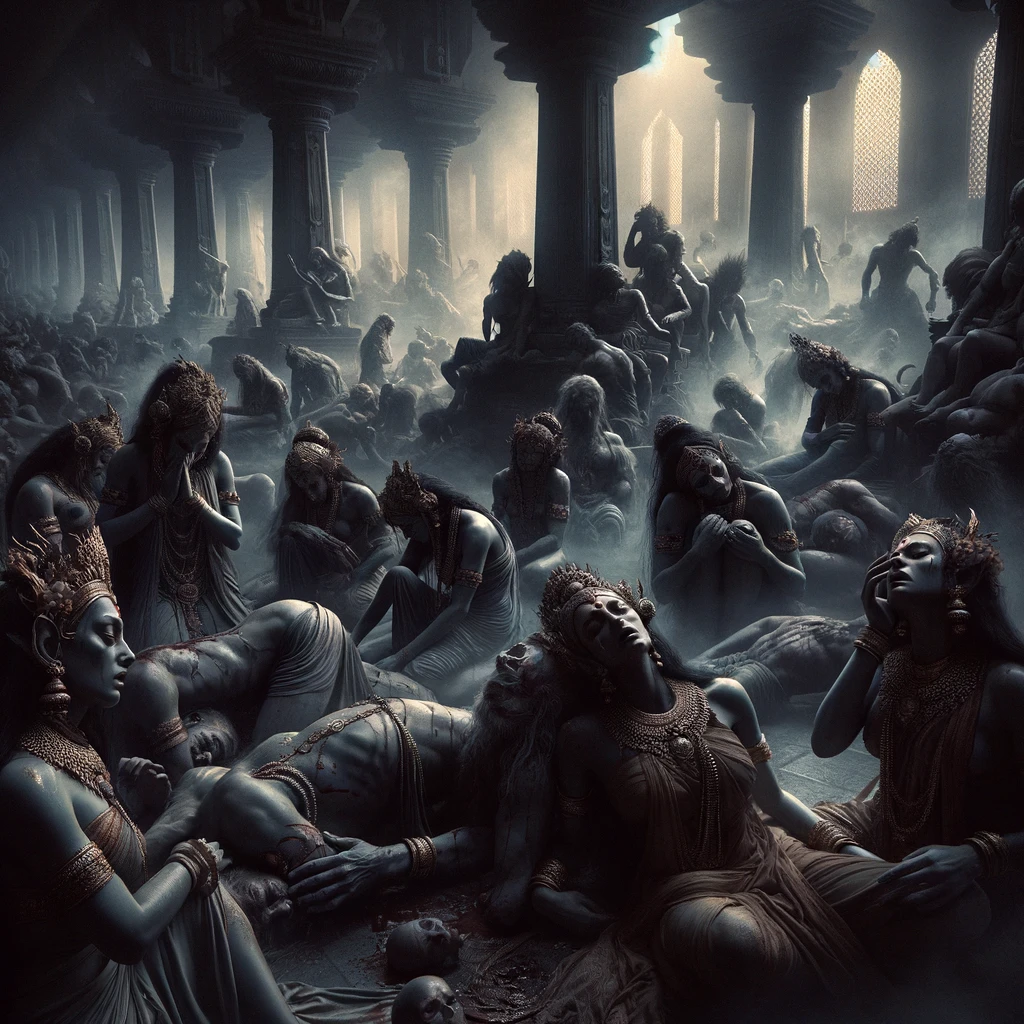Rama, who was unwearied by action, destroyed with His flaming arrows adorned with burnished gold the thousands of elephants and horses with riders, the thousands of chariots as bright as fire with flags, and the thousands of rakshasa warriors wielding clubs and iron bludgeons and carrying bright flags whom Ravana had dispatched. The rakshasas who survived the massacre, as well as those who were bewildered by hearing about it, gathered together overwhelmed with anxiety. Rakshasis who had lost their husbands, sons and relatives, gathered together and wailed because of the anguish they felt.
They lamented: “Why did that old and hideous Shuurpanakha with a sunken belly approach Rama, who is equal in beauty to Cupid, in the Dandaka Forest? When that ugly woman who deserves to be killed saw that handsome young man who is most powerful and dedicated to the good of all, she became overwhelmed with lust. How could that unsightly rakshasi devoid of good qualities fall in love with that handsome Rama, who possesses abundant good qualities and uncommon vigor? Because of our bad luck, that wrinkled, gray-haired incompatible hag attempted a laughable misdeed blamable by the whole world. For the destruction of rakshasas and that of Khara and Duushana in particular she tried to profane Rama. It was on account of her that Ravana initiated this great enmity with Rama by abducting Sita for his own destruction. The ten-headed Ravana will not be able to touch Sita and he has established an unending enmity with Rama.
“When Rama saw that the rakshasa Viradha was interested in Sita, He slew him single-handed. That should have been sufficient evidence of His ability to defeat His enemies. His arrows destroyed fourteen thousand rakshasas of terrible deeds in Janasthaana with His fire-like arrows. He struck down Khara and Duushana with His arrows as bright as the sun. That should have been sufficient evidence. He also killed the blood-thirsty Kabandha, whose arms were one yojana long, when he was roaring angrily. That should have been sufficient evidence. Rama killed the mighty Vali, the son of Lord Indra, who was like Mount Meru. That should have been sufficient evidence. After living in misery on Mount Rishyamuka with all his desires frustrated, Sugreeva regained the royal throne. That should have been sufficient evidence.
“Ravana did not care for Vibhishana’s reasonable advice, which was conducive to virtue and material gain, and was beneficial to all the rakshasas. If Ravana had followed Vibhishana’s advice, this city of Lanka would not be afflicted with sorrow and converted into a crematorium. Ravana has not understood Rama’s greatness, even after hearing about Kumbhakarna’s death, the slaughter of the unassailable Atikaya by Lakshmana, and the death of his own dear son Indrajit. One can hear the rakshasis in every family wailing: “My son, my brother and my husband have been slain in battle!” Rama has struck down thousands of chariots, horses, elephants and foot soldiers all over the battlefield. Either it is Rudra, or Vishnu or the great Indra who is slaughtering us in the guise of Rama, or else it is death personified. Our eminent warriors having been killed by Rama, we have lost all hope for life. Failing to see the end of our fear, we are lamenting.
“The valorous Ravana who had received a great boon, does not recognize this great danger which has arisen from the hand of Rama. Neither gods, nor gandharvas, nor pishacas, nor rakshasas will be able to protect him when Rama attacks him in combat. Ill omens have been seen during every one of Ravana’s encounters with his enemy Rama. They obviously indicate his destruction by Rama. When Lord Brahma was satisfied by Ravana, he granted him fearlessness from gods, danavas and rakshasas. But he did not ask for protection from human beings. Therefore I think that this human being Rama is undoubtedly the cause of life-threatening danger for us rakshasas and for Ravana.
“While being oppressed by the mighty Ravana on the strength of the boon he received for severe austerities, the gods worshiped Lord Brahma. Pleased by their worship, Lord Brahma in fact gave them the following assurance for their good: ‘Henceforth all the danavas and rakshasas will wander the three worlds in constant fear.’ All the gods headed by Indra gathered together and then propitiated Lord Shiva, the destroyer of the three cities and he whose emblem is a bull. When pleased, Lord Shiva spoke the following words to the gods: ‘For your benefit a woman will appear for the destruction of the rakshasas.’ This woman Sita, being used by the gods, will consume us all, as hunger consumed the danavas in the past. Because of the misconduct of the evil-minded Ravana, this terrible destruction accompanied by sorrow has arisen. Being threatened by Rama as if by providence itself at the end of the age, we do not see anyone in this world who can give us shelter. There is no shelter for us who stand in great peril, any more than for she-elephants surrounded by a forest fire. The great Vibhishana did something opportune by taking shelter of one whom he saw as a future cause of danger.”
Tightly embracing one another with their arms, all the rakshasis became despondent. Stricken with intense fear, they began howling dreadfully.
Thus completes 94th Chapter of Yuddha Kanda of the glorious Ramayana of Valmiki, the work of a sage and the oldest epic.
Sriman Moola Rama Vijayate


